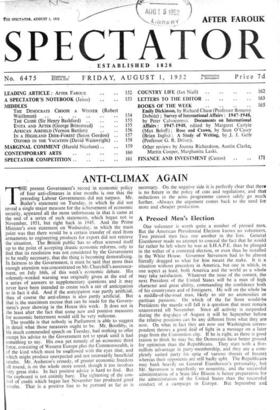ANTI-CLIMAX AGAIN
HE present Government's record in economic policy of four anti-climaxes in nine months is one that the preceding Labour Governments did not surpass. Mr. Butler's statement on Tuesday, in which he did not reveal a single major measure for the achievement of economic security, appeared all the more unfortunate in that it came at the end of a series of such statements, which began not in November, 1951, but right back in 1945. And the Prime Minister's own statement on Wednesday, in which the main point was that there would be a certain transfer of steel from armaments to engineering products for export did not retrieve the 'situation. The British public has so often screwed itself up to the point of accepting drastic economic reforms, only to find that its resolution was not considered by the Government to be really necessary, that the thing is becoming demoralising. In fairness to the Government, it must be said that more than enough attention was concentrated on Mr. Churchill's announce- ment, on July 16th, of this week's economic debate. His solemnly-worded warning was originally given at the end of a series of answers to supplementary questions and it may never have been intended to create such a stir of anticipation as in fact it did. And if the anticipation was partly artificial, then of course the anti-climax is also partly artificial. But that is the maximum excuse that can be made for the Govern- ment's poor showing in the House this week. It does not in the least alter the fact that some new and positive measures for economic betterment would still be very welcome.
The trouble is that nobody in Parliament is able to suggest in detail what those measures ought to be. Mr. Boothby, in his much commended speech on Tuesday, had nothing to offer except his advice to the Government not to speak until it had something to say. His own pet remedy of an economic third force, consisting of Western Europe plus the Commonwealth, is of the kind which must be svollowed with the eyes shut, and which might produce unexpected and not necessarily beneficial results. Mr. Assheton's remedy, of greater economic freedom all round, is on the whole more sound, though it too involves very great risks. In fact positive advice is hard to find. But the cupboard is not entirely bare. The tightening of the con- trol of credit which began last November has produced good results. That is a positive line to be pursued as far as is necessary. On the negative side it is perfectly clear that them is no future in the policy of cuts and regulations, and that reductions in the arms programme cannot safely go much further. .Always the argument comes back to the need for more and cheaper production.


























